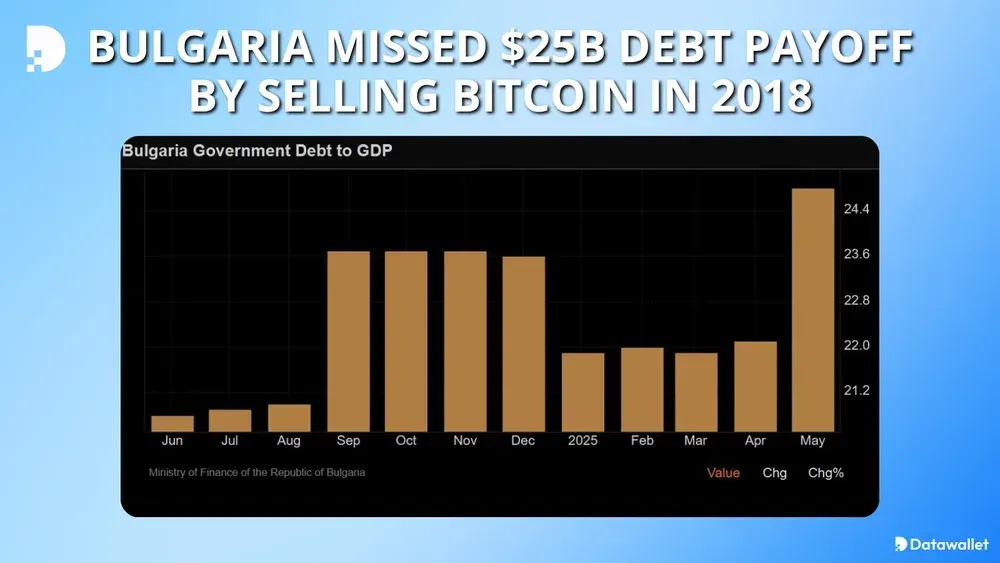The US Government May Have Sold 85% of Its Bitcoin

GM. The US Marshals Service may have sold off 85% of its Bitcoin holdings, with new FOIA documents showing just 28,988 BTC remaining, far below current public estimates.
Meanwhile, Trump secures House votes to pass the GENIUS Act, the EU’s AML authority warns crypto firms on compliance gaps, and Eclipse announces a 100 million token airdrop.
From offloaded reserves to onchain giveaways, the cycle is heating up. 👇
The US Government May Have Sold 85% of Its Bitcoin
The US Marshals Service holds 28,988 Bitcoin valued around $1.6 billion, according to FOIA documents obtained by journalist L0la L33tz. This number sharply contrasts prior estimates placing federal Bitcoin holdings near 200,000 BTC worth $23.6 billion.
These assets stem primarily from finalized criminal forfeitures linked to major enforcement operations like the Silk Road shutdown. Specific case details, transaction dates, and asset identifiers were redacted, but the total provided clarifies actual government-owned Bitcoin reserves.
Blockchain analytics platform Arkham currently lists the US government with about 198,000 BTC, but its data might mistakenly include assets seized in unresolved cases. The Marshals' figures highlight confusion regarding officially forfeited versus merely seized Bitcoin.
The disclosure arrives months after President Trump's executive order requiring federal crypto audits by April 5, a report yet to be publicly released. Nakamoto Bitcoin treasury head David Bailey previously promised $10,000 for information on the Marshals' true BTC holdings, potentially rewarding L33tz’s discovery.
Trump Secures House Votes for Crypto Bill Passage
President Trump said that key Republican lawmakers have pledged to back the GENIUS Act during a scheduled House vote on Wednesday. He posted on Truth Social that 11 of the 12 needed members confirmed their support after a private meeting in the Oval Office. Trump added that House Speaker Mike Johnson is prepared to bring the bill forward "as early as possible."
The GENIUS Act passed the Senate and would require stablecoins to be fully dollar-backed and subject to strict audit rules. It stalled earlier in the week after several Republicans opposed the vote but regained momentum following Trump’s outreach. Voting is now set for 12:20 p.m. Wednesday alongside other crypto-focused bills, including the Clarity and Anti-CBDC Acts.
EU AML Authority Warns Crypto Firms on Compliance
The EU's Anti-Money Laundering Authority (AMLA) issued a US warning to crypto platforms on July 16, citing risks tied to fragmented oversight across EU member states. AMLA chair Bruna Szego said regulators must now verify the identities and ownership structures of crypto firms under expanded anti-money laundering rules. She also flagged diverging national standards as a major hurdle to enforcement.
The new rules ban anonymous wallets and privacy coins like Monero and require platforms to grant direct account access to financial watchdogs by July 2027. Legal experts said these updates reflect a hardline stance similar to that of the UK’s FCA. AMLA’s compliance regime will apply to all registered VASPs in the EU regardless of location or size.
Eclipse to Airdrop 100M ES Tokens to Users
Eclipse Foundation announced July 16 it will distribute 100 million ES tokens to early users based on game activity, social media engagement, and Discord presence. The tokens represent 10% of total supply and are part of a broader launch strategy tied to the new Eclipse blockchain, dubbed a “Solana on Ethereum” hybrid. The airdrop will be distributed over 30 days, with eligibility snapshots published afterward.
The rest of the ES supply is allocated across ecosystem growth (35%), early backers (31%), and long-term contributor lockups (19%). Team members will not receive airdrop tokens but are compensated separately under a four-year vesting plan. ES will be used for governance and gas fees across Eclipse’s multi-chain deployment on Ethereum, Solana, and its own network.
Data of the Day
Bulgaria sold 213,500 Bitcoin in 2018 after a major seizure the year before, missing out on what is now a $25 billion windfall. The government sold the assets when BTC was worth roughly $3.5 billion, less than a fifth of its current value, drawing renewed criticism from analysts. The Bitcoin would now surpass the country’s total national debt of $24 billion.
Critics say the decision stemmed from regulatory uncertainty and limited institutional understanding of crypto’s long-term value. Some experts argue Bulgaria could have retained a portion as a sovereign reserve and gradually liquidated the rest. Officials have denied still holding the Bitcoin, but debate over the sale’s impact continues across the country’s economic circles.

More Breaking News
- SRM Entertainment has rebranded as Tron Inc., adopting the TRON ticker after staking 365 million TRX as part of a $100 million strategy.
- Vitalik Buterin advised Layer-2 developers to prioritize minimalism, responding to growing calls for smaller chains to become Ethereum-based L2s.
- Cantor Fitzgerald’s SPAC is finalizing a $4 billion Bitcoin deal with Adam Back, potentially one of the largest crypto transactions to date.
- Roger Ver is suing Spain in the European Court of Human Rights to block extradition, facing US charges tied to $48 million in taxes.
- PumpFun has started repurchasing billions of PUMP tokens using fee revenue, deploying $19.3 million in SOL to execute the buyback.
- Elliptic reports cross-chain crypto crime has tripled to $21.8 billion in 2025, with a notable share linked to North Korean hacking groups.
- PayPal informally updated its terms to include Arbitrum as a supported network for PYUSD stablecoin, alongside Ethereum and Solana.
- According to Reuters, Citigroup, the third-biggest bank in the US, is considering issuing its own stablecoin in order to increase the functionality of digital payments.
For the latest updates on digital asset markets, follow us on X @Datawalletcom.
.webp)
Written by
Jed Barker
Editor-in-Chief
Jed, a digital asset analyst since 2015, founded Datawallet to simplify crypto and decentralized finance. His background includes research roles in leading publications and a venture firm, reflecting his commitment to making complex financial concepts accessible.







